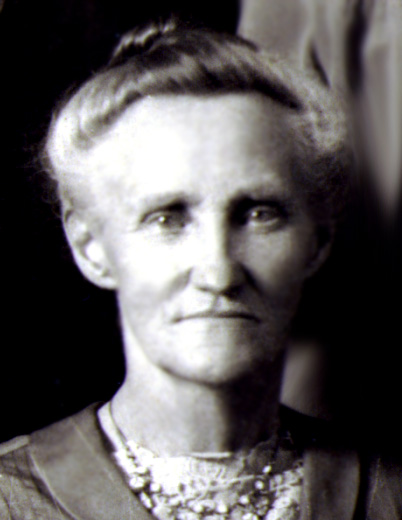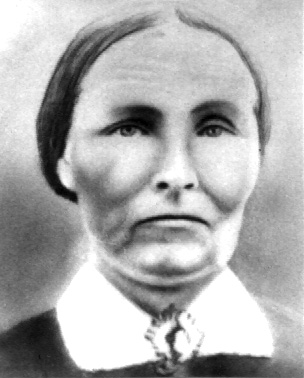



 |
 |
|
|
BERTHA KNUDSEN MADSEN
|
And Her Mother
BERGITTA LARSEN JOHNSON KNUDSEN |
Pioneers Who Came To Utah In 1864
Written By CLARA MADSEN TAYLOR
Daughter of BERTHA K. MADSEN
of CAMP TAMARACK
of DAUGHTERS of UTAH PIONEERS
of UTAH COUNTY
Lake View, Utah
March 1937
Let us turn back the pages of time about eighty three years to find ourselves in Norway, the land of the midnight sun, the home of the beautiful scenery, the birthplace of the old Norsk Pirates, the place where thousands of children listened to the thrilling old legends, and where many people are still superstitious.
In a quiet little farming village called Layton (full name, Ostere Sween Laitain Hedemarken) lived a family by the name of Knudsen. The father, Hans Knudsen, a man who had been educated for the ministry of the Lutheran Church, was a scholarly man who knew his Bible almost from memory. The mother, Bergitta Larsen Johnson Knudsen, had been previously married to a man by the name of John Johnson. She was born December 22, 1816, and as a child worked on the farm and herded cattle. She hardly knew fear and was often left alone with the cattle for days at a time. She loved the out of doors life very much better than the house work, and was full of fun and loved to play a joke on anyone. She was married to John Johnson and to them was born one son and two daughters, John, Inger and Lena. Her husband died, leaving her with the three small children and the farm and cattle to care for. Later, she married Hans Knudsen.
One day a young man by the name of Lars Larsen came to their home and brought to the gospel of Jesus Christ. They were naturally religious and fair minded, so after much study and earnest thought and prayer, they decided to join this, the most unpopular and despised religion of the day, the Mormon Religion.
Bergitta was baptized in January, 1863, in a mill pond, where thick ice had to be cut so the baptism could be performed. Elder Jens Pederson baptized her. This was the beginning of much trouble. Their family now was larger, five children having been born to her since she married Grandfather Knudsen; Andrew, Herman, Christina, Bertha and Ellen. (At the time of this writing, March 4, 1937, all of these are dead but my mother Bertha. She was 77 years old on February 26, 1937.)
Try to imagine the amount of courage it took to leave a home they loved and all that was dear to them, leave with eight children and go to an unknown land and people who spoke a new language, had new customs and were absolutely different and unfamiliar -- and why -- because they knew that they had found the truth and they had the supreme courage to sacrifice all and brave the future to prosper or fail. Mother tells of the large bag of gold, and of large trunks of choice woolen, silver and china that were packed ready for the journey. They left home April 2, 1884. They stopped at Christaina [sic] to prepare for the journey. Then they boarded a steamboat which took them to Copenhagen, Denmark, from there to Hamburg, Germany by steamboat part way and by sail boat the remainder. There were 973 emigrants under the leadership of a man named Captain John Smith and also J. P. R. Johnson, who later was the husband of Inger, Mother's sister.
The voyage was not a pleasant one. The ships in 1864 were not comfortable and commodious as they are now. One can hardly imagine how cheerless, miserable and inadequate they were. When they were at mid ocean, measles broke out and the misery and losses were terrible. Sixty-seven people died and were buried at sea. Many a heartsick father and mother were forced to stand by and watch their loved ones lowered into a watery grave. Mother and Father Knudsen fasted and prayed they might keep their children at least until they reached land. Their prayers were answered at that time.
It was impossible to live as they should. Try to feature hundreds of people trying to cook on the same stove, poor food, bad weather, horrid sleeping quarters -- it is no wonder that disease was prevalent. The two youngest children, Bertha and Ellen became seriously ill with the measles. After months of sickness, hardships and misery, they landed, June 3, in New York City. The children were still ill. They were placed on trains in different cars and the family was divided. Bertha was not expected to live till morning; she was left in the care of her older sister, Inger. During the night the car in which they were riding was side tracked and poor Mother thought she would never again see her daughter alive. During the night, however, Bertha changed for the better and in the morning the car was again attached to the others and they all continued their journey.
Then came the trip across the plains. The father purchased the best team available, but the best was slow and inadequate. Then, in the middle of the plains, they were asked to unload every thing that was not absolutely necessary for the remaining part of the trip. The large trunks filled with valuable treasures were left behind with the understanding that they would again posses them, but they never saw them or their contents again.
Because of her illness and her youth, Mother can remember very little of the trip across the plains. She tells of a lady who had lost a loved one; she, grandmother and some other ladies were crying about it. She remembers how hard she tried to cry, too. But the tears would not come. She tells of another woman who, on coming to a stream was thirsty and had no cup so, she took off her shoe and drank from it. This shocked Mother greatly. She still remembers the incident.
Poor little Ellen, Mother's younger sister, never regained her health after the measles and at Echo Canyon, she died. Though grief stricken at her loss, they were all greatful [sic] that she lived to be buried in mother earth. She was buried in a plain board casket. The best her father could make from the goods boxes. He placed a board at the head of her grave, but years later when Uncle John returned, he could not locate the little grave.
When they reached Provo, in October, six months after that cold April morning when they had left Norway, the bag of gold was not nearly as heavy as the day Grandfather put it into the sleigh. He had loaned gold here and there and divided with people who were less fortunate than he. They located at Fort Field. The children were treated unkindly because they could not speak the English language or understand the others. One night, Uncle Andrew came home all bruised and crying saying that the boys had beaten him and called him a dirty "Dane." That mother, who for the past year had undergone all kinds of hardships uncomplainingly now cried and said, "Is this Zion?"
Perhaps no one except the pioneers will ever understand the hardships they endured during that never-to-be forgotten six months of travel from Norway to Provo, Utah. Their troubles were not over even now. They began farming with no implements or anything to work with. Mother had to work all the day in the fields with her brothers and then come home and cut grass for twelve oxen with an axe and then assist with the house work, which required doing the washing by hand. Many times she was thankful for a wash board as many of her acquaintances had not even one of those. She used to iron fancy tucked bosomed white shirts with stove irons. She made and sold yeast or traded it for sugar. She cut and dried apples and peaches by the bushel. In every way she helped to earn their meager living. He schooling was very limited for at that time it was considered quite unnecessary for girls to have an education. She attended the school for a short time that was furnished by Grandfather Madsen. She was fortunate in attending long enough to learn to read and write and master a few fundamentals lessons. One of my cherished memories is of her reading to us children. I remember they bought a Bible Scroll and the pleasant hours spent with it.
This sturdy industrious family worked and saved until they soon had their share of this world's goods.
Mother married Peter Madsen on June 2, 1881. He was the son of another pioneer couple, Bishop Peter Madsen and Mary Ann Madsen whose history I will write later. The lived a short time down by the river on the Madsen farm and then moved onto their present home. Their outlook was not too pleasant. Sage brush and drifting sand was about all that greeted their gaze when they first moved into their humble two roomed house. Time and hard work plus plenty of sacrifice made of that cheerless abode what is to me, a beautiful home with its well kept lawn and flowers. No one ever sees weeds or dandelions or disorder in Mother's yard.
To this couple have been born seven children, Peter Jr, who died at the age of ten, John William, Anne Pearl, Clara, Evely, Spencer and Raymond Lamar, who died at the age of five months.
For twenty years Mother and Father it seems, had more than their share of the hardships of this life. Defeat faced them at every turn until they were nearly distracted. They had a Brother Hall from Springville come to our home and pray that things would be more pleasant for us. I shall never forget that prayer. He had us all kneel in a circle and he offered the most beautiful prayer I have ever heard and from that day to this, things have gone more smoothly.
Mother's five living children are married and have families. She had twenty-one grandchildren and five great grandchildren. William went on a mission to England and Norway and her grandson, Duane Madsen is in Denmark at the time of this writing.
She has always been a faithful, prayerful woman and her life will always be an open book. She is unassuming, but ever ready to do the very best that is in her power. She is ambitious, unselfish, thrifty, honest, and independent. May the remaining days of her life be as pleasant as she had tried to make life for all with whom she has associated.
